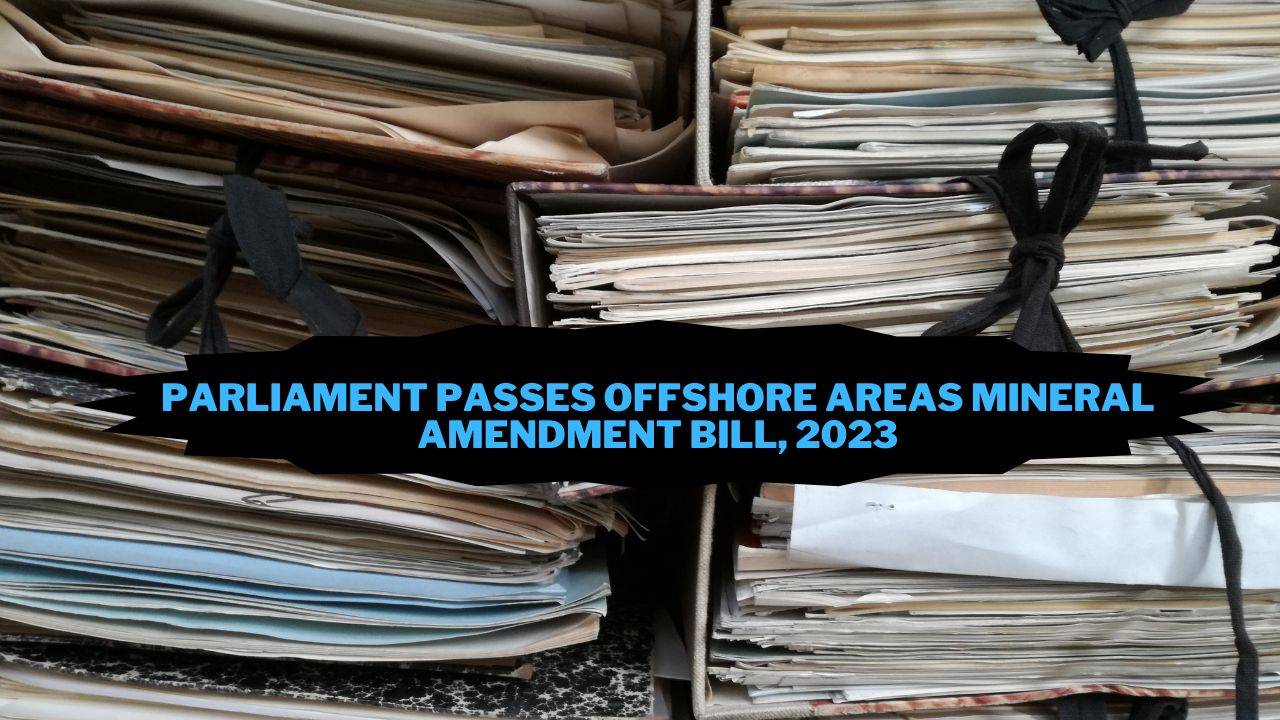
The Rajya Sabha passed the Offshore Areas Mineral (Development and Regulation) Amendment Bill, 2023 yesterday which seeks to make amendments to the Offshore Areas Mineral (Development and Regulation) Act, 2002 (‘OAMDR Act’).
The Bill was passed by Lok Sabha on August 1, 2023. The Bill will now be sent to the President of India for assent.
The proposed amendment in the Act will bring major reform by introducing auction as the method of allocation of operating rights in offshore areas.
The OAMDR Act, 2002 came into force in 2010. However, no mining activity has been undertaken in the offshore areas till date. Hence, the Central Government has proposed the present Amendment Bill to bring several reforms in the offshore mining sector.
The OAMDR Act in its current form contains scope for discretion and does not provide for fair and transparent allocation of operating rights in the offshore areas. The Mines and Minerals (Development and Regulation) Act, 1957 (MMDR Act) was amended in January 2015 to provide for the allocation of mineral concessions in onshore areas through auction.
Since its implementation, 286 mineral blocks have been auctioned for grant of mining lease or composite licence. The transparent process has also generated additional revenue sources for the State Governments in terms of auction premiums. The introduction of the auction regime through the present amendment in the OAMDR Act is expected to provide the necessary energy to the sector.
India has a unique maritime position. India’s Exclusive Economic Zone (EEZ) of over two million square kilometers holds significant recoverable resources. GSI has delineated the resources of the following minerals in the offshore areas:
-
1,53,996 million tons of lime mud within the EEZ off Gujarat and Maharashtra coasts.
-
745 million tons of construction-grade sand off the Kerala coast.
-
79 million tons of heavy mineral placers in the inner-shelf and mid-shelf off Odisha, Andhra Pradesh, Kerala, Tamil Nadu, and Maharashtra.
-
Phosphorite in the Eastern and Western continental margins.
-
Polymetallic Ferromanganese (Fe-Mn) nodules and crusts in the Andaman Sea and Lakshadweep Sea.
As India aims to become a high-growth economy, it needs to harness its maritime resources to their optimal capacity. In order to harness the full potential of these maritime resources, it is imperative to encourage the participation of the public and private sectors. The private sector will bring the necessary expertise and technology to explore and mine the mineral resources present in the EEZ.
The salient features of the Amendment Bill are as under:
1. Two types of operating rights to be granted under the Act to the private sector only through auction by competitive bidding, viz. production lease and composite license.
2. Composite license introduced in the Act is a two-stage operating right granted for the purpose of undertaking exploration followed by production operation.
3. Operating rights to be granted to PSUs in the mineral-bearing areas reserved by the Central Government.
4. Provision has been made for the grant of operating rights only to PSUs in the case of atomic minerals.
5. Provision for renewal of production leases has been removed and its period is fixed as 50 years on lines similar to the MMDR Act.
6. A limit has been introduced on the total area one person can acquire in offshore. Now, a person cannot acquire more than 45 minutes latitude by 45 minutes longitude in respect of any mineral or prescribed group of associated minerals under one or more operating rights (taken together).
7. To ensure the availability of funds for exploration, mitigation of the adverse impact of offshore mining, disaster relief, research, interest and benefit of the persons affected by exploration or production operations, etc., a provision has been made for setting up of a non-lapsable Offshore Areas Mineral Trust which will maintain a fund under the Public Account of India. This will be funded by an additional levy on the production of minerals, not exceeding one-third of the royalty. The exact rate of additional levy will be prescribed by the Central Government.
8. To promote ease of doing business, a provision has been made for easy transfer of composite license or production lease.
9. To ensure the timely start of production from the leases, the bill introduces the timelines for the commencement of production and dispatch after the execution of the production lease.
10. Royalty, auction premium, and other revenues from the production of minerals from offshore areas shall accrue to the Government of India.









